Reflective Leadership Essay: Leadership Philosophy and Analysis
VerifiedAdded on 2021/06/17
|8
|2184
|363
Essay
AI Summary
This reflective leadership essay explores the author's personal leadership philosophy, drawing from childhood influences, motivational sources, and experiences in organizing departmental functions. The essay emphasizes the author's preference for democratic leadership, the importance of emotional intelligence, and the role of risk-taking within ethical boundaries. It analyzes the application of leadership principles, focusing on the significance of self-awareness, self-regulation, internal motivation, empathy, and social skills. The essay also includes an analysis of emotional intelligence in the context of a professional internship, highlighting the impact of leaders' emotional expressions and the need for leaders to understand and manage emotions effectively. The essay concludes by reinforcing the importance of emotional intelligence, communication, and team collaboration in effective leadership.
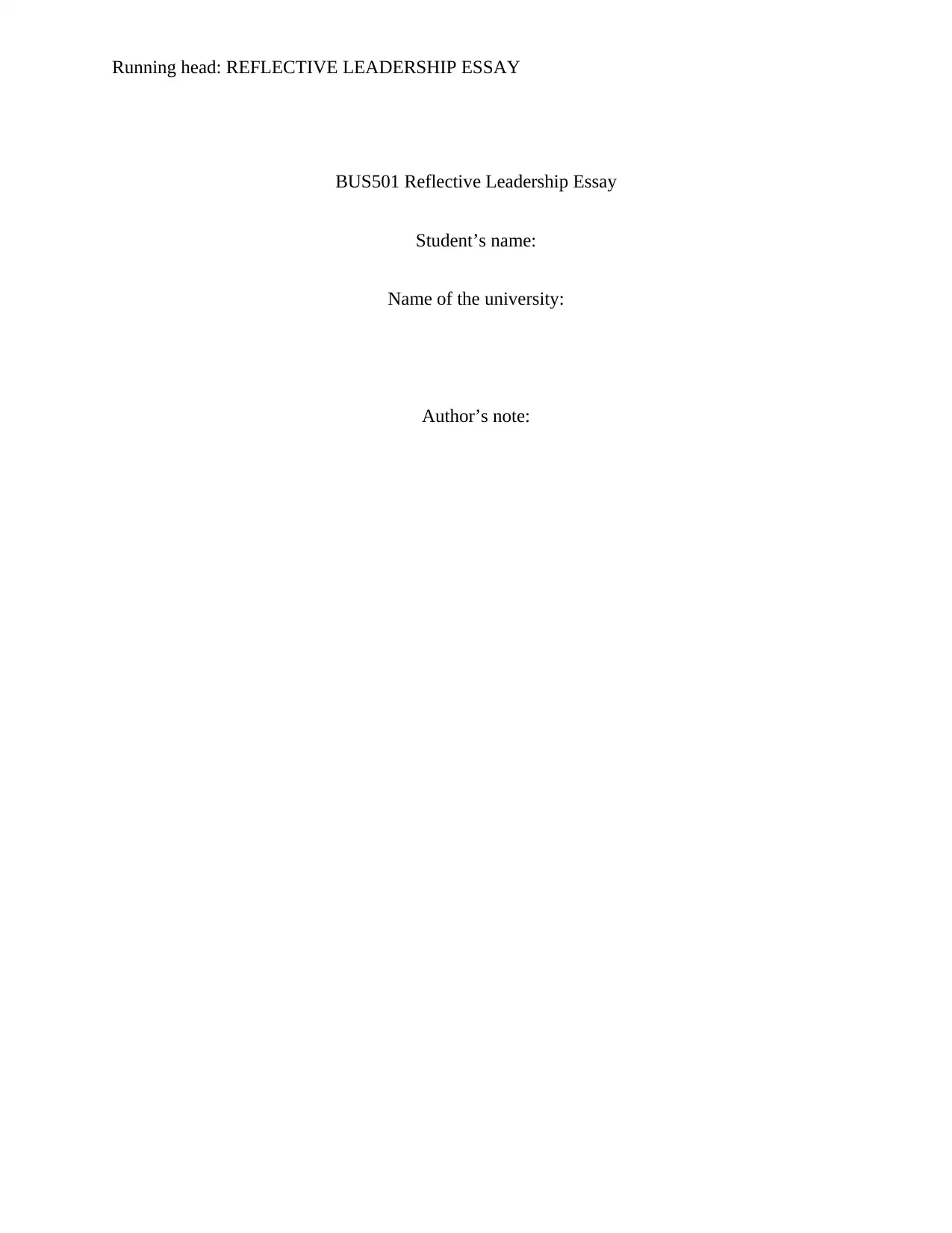
Running head: REFLECTIVE LEADERSHIP ESSAY
BUS501 Reflective Leadership Essay
Student’s name:
Name of the university:
Author’s note:
BUS501 Reflective Leadership Essay
Student’s name:
Name of the university:
Author’s note:
Paraphrase This Document
Need a fresh take? Get an instant paraphrase of this document with our AI Paraphraser
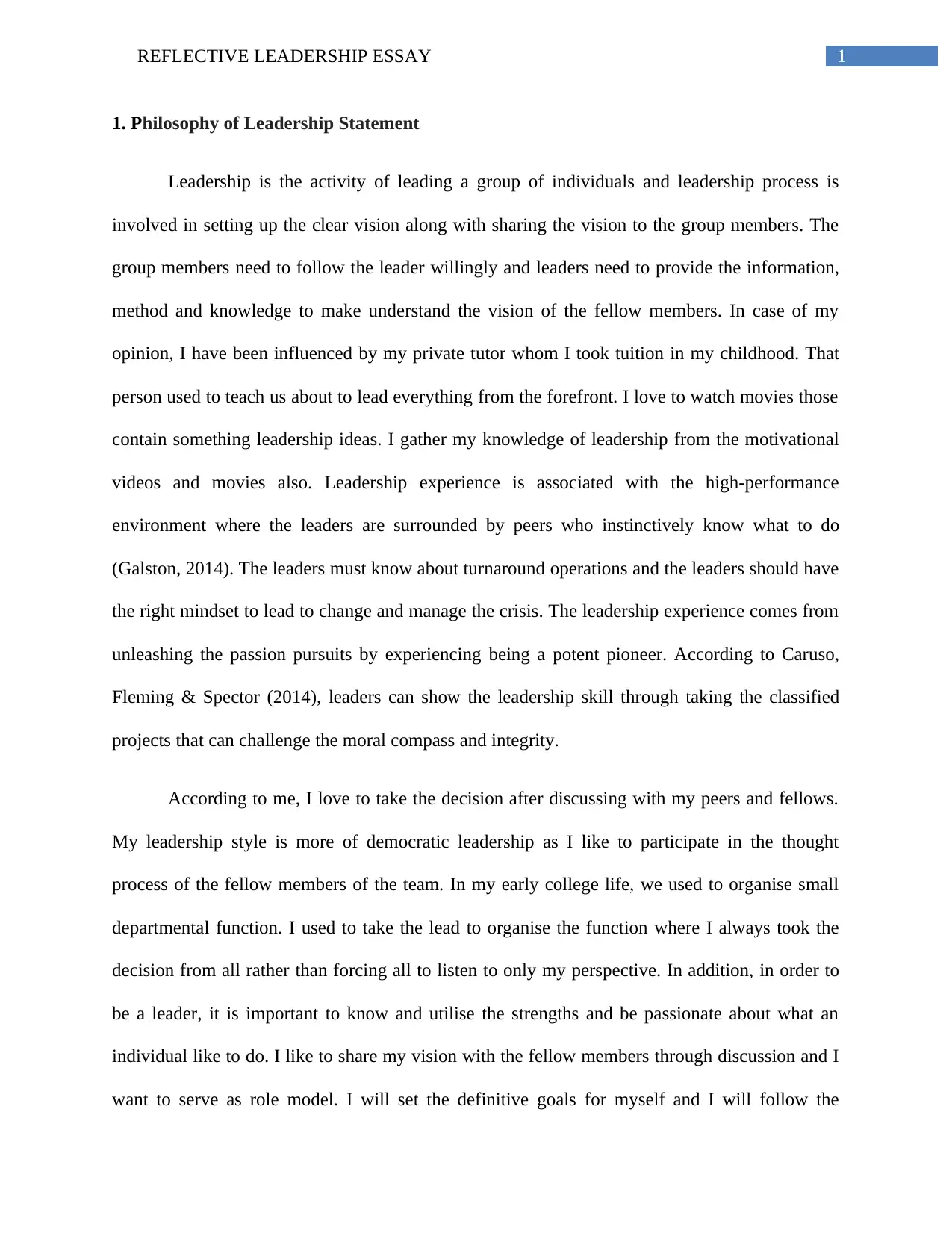
1REFLECTIVE LEADERSHIP ESSAY
1. Philosophy of Leadership Statement
Leadership is the activity of leading a group of individuals and leadership process is
involved in setting up the clear vision along with sharing the vision to the group members. The
group members need to follow the leader willingly and leaders need to provide the information,
method and knowledge to make understand the vision of the fellow members. In case of my
opinion, I have been influenced by my private tutor whom I took tuition in my childhood. That
person used to teach us about to lead everything from the forefront. I love to watch movies those
contain something leadership ideas. I gather my knowledge of leadership from the motivational
videos and movies also. Leadership experience is associated with the high-performance
environment where the leaders are surrounded by peers who instinctively know what to do
(Galston, 2014). The leaders must know about turnaround operations and the leaders should have
the right mindset to lead to change and manage the crisis. The leadership experience comes from
unleashing the passion pursuits by experiencing being a potent pioneer. According to Caruso,
Fleming & Spector (2014), leaders can show the leadership skill through taking the classified
projects that can challenge the moral compass and integrity.
According to me, I love to take the decision after discussing with my peers and fellows.
My leadership style is more of democratic leadership as I like to participate in the thought
process of the fellow members of the team. In my early college life, we used to organise small
departmental function. I used to take the lead to organise the function where I always took the
decision from all rather than forcing all to listen to only my perspective. In addition, in order to
be a leader, it is important to know and utilise the strengths and be passionate about what an
individual like to do. I like to share my vision with the fellow members through discussion and I
want to serve as role model. I will set the definitive goals for myself and I will follow the
1. Philosophy of Leadership Statement
Leadership is the activity of leading a group of individuals and leadership process is
involved in setting up the clear vision along with sharing the vision to the group members. The
group members need to follow the leader willingly and leaders need to provide the information,
method and knowledge to make understand the vision of the fellow members. In case of my
opinion, I have been influenced by my private tutor whom I took tuition in my childhood. That
person used to teach us about to lead everything from the forefront. I love to watch movies those
contain something leadership ideas. I gather my knowledge of leadership from the motivational
videos and movies also. Leadership experience is associated with the high-performance
environment where the leaders are surrounded by peers who instinctively know what to do
(Galston, 2014). The leaders must know about turnaround operations and the leaders should have
the right mindset to lead to change and manage the crisis. The leadership experience comes from
unleashing the passion pursuits by experiencing being a potent pioneer. According to Caruso,
Fleming & Spector (2014), leaders can show the leadership skill through taking the classified
projects that can challenge the moral compass and integrity.
According to me, I love to take the decision after discussing with my peers and fellows.
My leadership style is more of democratic leadership as I like to participate in the thought
process of the fellow members of the team. In my early college life, we used to organise small
departmental function. I used to take the lead to organise the function where I always took the
decision from all rather than forcing all to listen to only my perspective. In addition, in order to
be a leader, it is important to know and utilise the strengths and be passionate about what an
individual like to do. I like to share my vision with the fellow members through discussion and I
want to serve as role model. I will set the definitive goals for myself and I will follow the
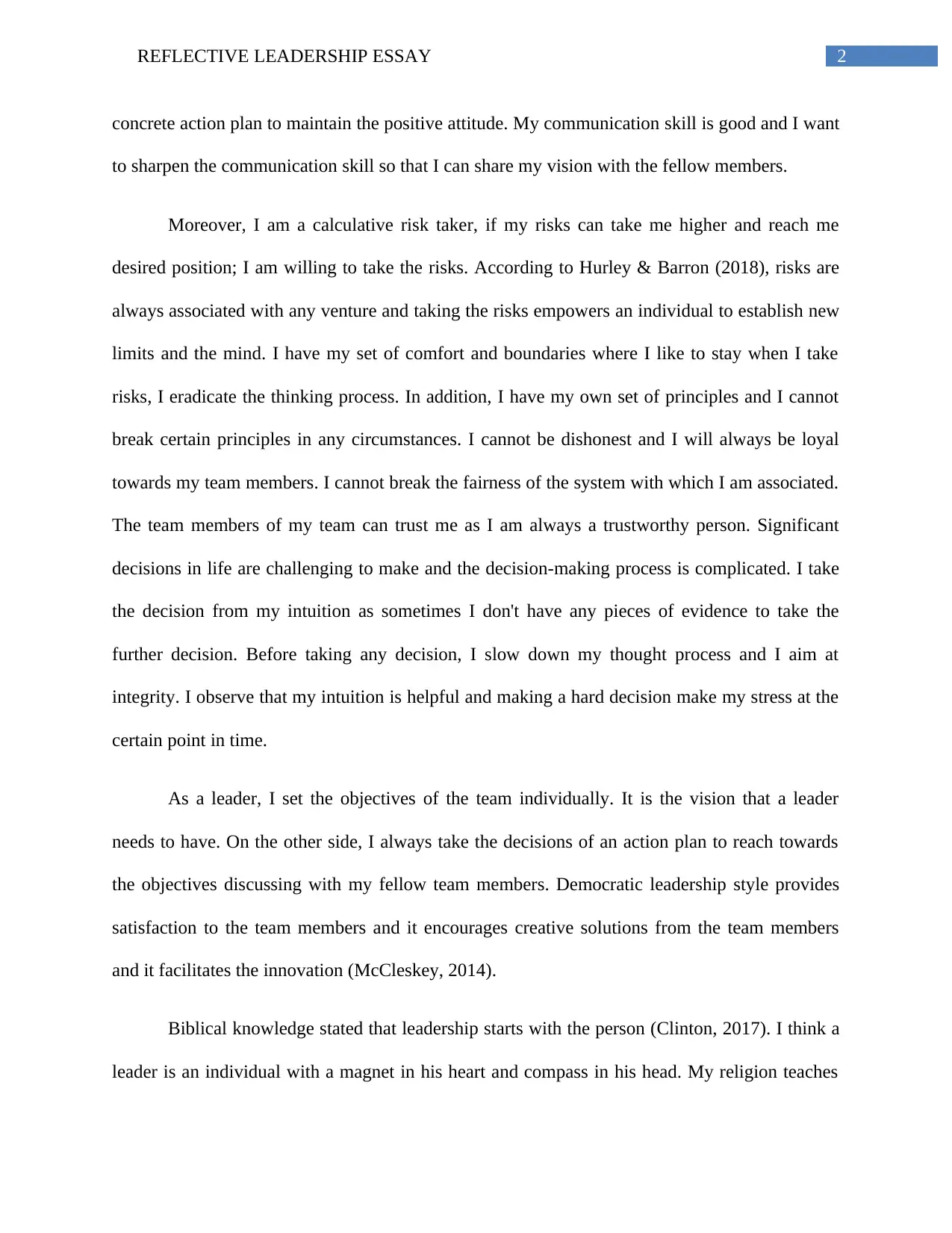
2REFLECTIVE LEADERSHIP ESSAY
concrete action plan to maintain the positive attitude. My communication skill is good and I want
to sharpen the communication skill so that I can share my vision with the fellow members.
Moreover, I am a calculative risk taker, if my risks can take me higher and reach me
desired position; I am willing to take the risks. According to Hurley & Barron (2018), risks are
always associated with any venture and taking the risks empowers an individual to establish new
limits and the mind. I have my set of comfort and boundaries where I like to stay when I take
risks, I eradicate the thinking process. In addition, I have my own set of principles and I cannot
break certain principles in any circumstances. I cannot be dishonest and I will always be loyal
towards my team members. I cannot break the fairness of the system with which I am associated.
The team members of my team can trust me as I am always a trustworthy person. Significant
decisions in life are challenging to make and the decision-making process is complicated. I take
the decision from my intuition as sometimes I don't have any pieces of evidence to take the
further decision. Before taking any decision, I slow down my thought process and I aim at
integrity. I observe that my intuition is helpful and making a hard decision make my stress at the
certain point in time.
As a leader, I set the objectives of the team individually. It is the vision that a leader
needs to have. On the other side, I always take the decisions of an action plan to reach towards
the objectives discussing with my fellow team members. Democratic leadership style provides
satisfaction to the team members and it encourages creative solutions from the team members
and it facilitates the innovation (McCleskey, 2014).
Biblical knowledge stated that leadership starts with the person (Clinton, 2017). I think a
leader is an individual with a magnet in his heart and compass in his head. My religion teaches
concrete action plan to maintain the positive attitude. My communication skill is good and I want
to sharpen the communication skill so that I can share my vision with the fellow members.
Moreover, I am a calculative risk taker, if my risks can take me higher and reach me
desired position; I am willing to take the risks. According to Hurley & Barron (2018), risks are
always associated with any venture and taking the risks empowers an individual to establish new
limits and the mind. I have my set of comfort and boundaries where I like to stay when I take
risks, I eradicate the thinking process. In addition, I have my own set of principles and I cannot
break certain principles in any circumstances. I cannot be dishonest and I will always be loyal
towards my team members. I cannot break the fairness of the system with which I am associated.
The team members of my team can trust me as I am always a trustworthy person. Significant
decisions in life are challenging to make and the decision-making process is complicated. I take
the decision from my intuition as sometimes I don't have any pieces of evidence to take the
further decision. Before taking any decision, I slow down my thought process and I aim at
integrity. I observe that my intuition is helpful and making a hard decision make my stress at the
certain point in time.
As a leader, I set the objectives of the team individually. It is the vision that a leader
needs to have. On the other side, I always take the decisions of an action plan to reach towards
the objectives discussing with my fellow team members. Democratic leadership style provides
satisfaction to the team members and it encourages creative solutions from the team members
and it facilitates the innovation (McCleskey, 2014).
Biblical knowledge stated that leadership starts with the person (Clinton, 2017). I think a
leader is an individual with a magnet in his heart and compass in his head. My religion teaches
⊘ This is a preview!⊘
Do you want full access?
Subscribe today to unlock all pages.

Trusted by 1+ million students worldwide
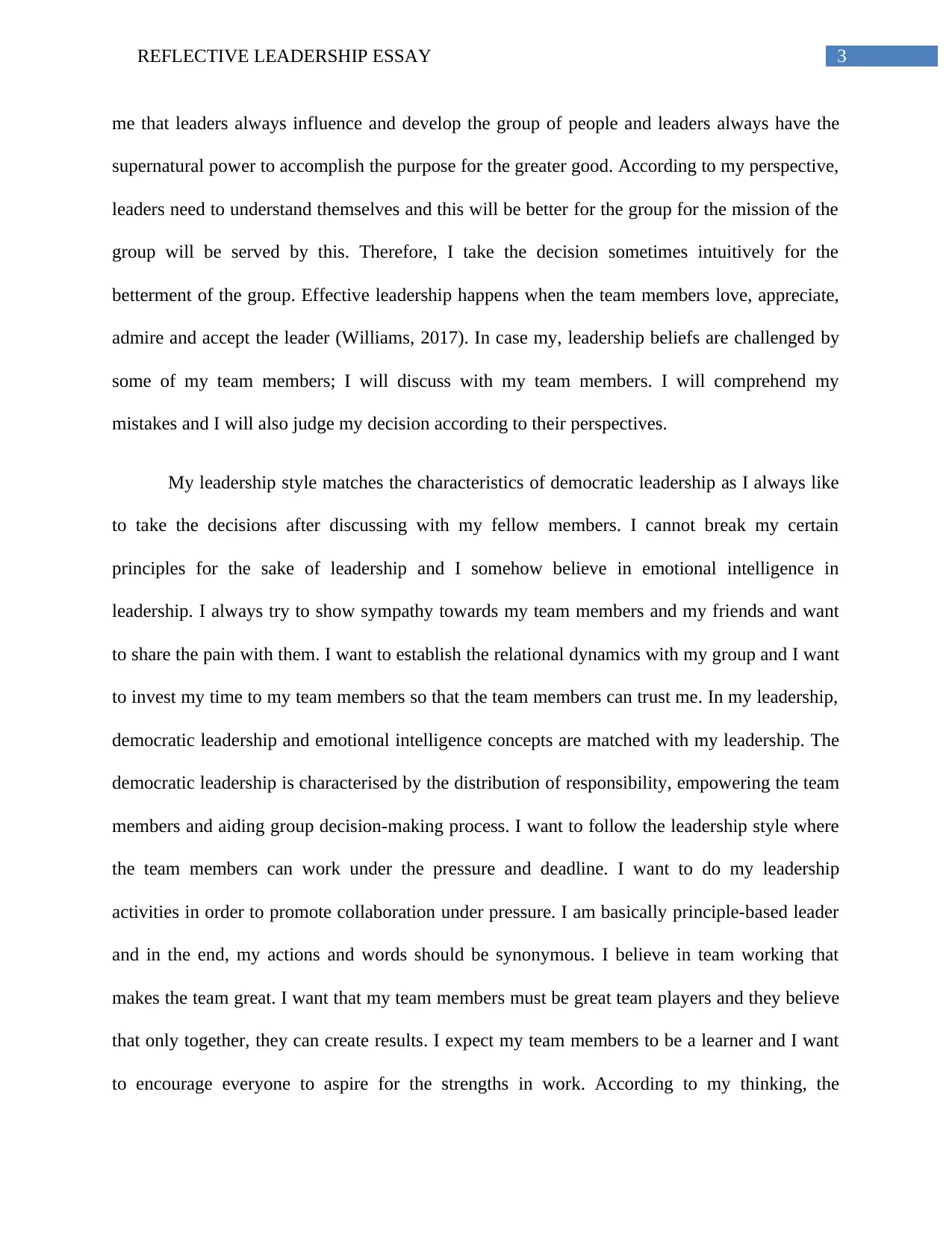
3REFLECTIVE LEADERSHIP ESSAY
me that leaders always influence and develop the group of people and leaders always have the
supernatural power to accomplish the purpose for the greater good. According to my perspective,
leaders need to understand themselves and this will be better for the group for the mission of the
group will be served by this. Therefore, I take the decision sometimes intuitively for the
betterment of the group. Effective leadership happens when the team members love, appreciate,
admire and accept the leader (Williams, 2017). In case my, leadership beliefs are challenged by
some of my team members; I will discuss with my team members. I will comprehend my
mistakes and I will also judge my decision according to their perspectives.
My leadership style matches the characteristics of democratic leadership as I always like
to take the decisions after discussing with my fellow members. I cannot break my certain
principles for the sake of leadership and I somehow believe in emotional intelligence in
leadership. I always try to show sympathy towards my team members and my friends and want
to share the pain with them. I want to establish the relational dynamics with my group and I want
to invest my time to my team members so that the team members can trust me. In my leadership,
democratic leadership and emotional intelligence concepts are matched with my leadership. The
democratic leadership is characterised by the distribution of responsibility, empowering the team
members and aiding group decision-making process. I want to follow the leadership style where
the team members can work under the pressure and deadline. I want to do my leadership
activities in order to promote collaboration under pressure. I am basically principle-based leader
and in the end, my actions and words should be synonymous. I believe in team working that
makes the team great. I want that my team members must be great team players and they believe
that only together, they can create results. I expect my team members to be a learner and I want
to encourage everyone to aspire for the strengths in work. According to my thinking, the
me that leaders always influence and develop the group of people and leaders always have the
supernatural power to accomplish the purpose for the greater good. According to my perspective,
leaders need to understand themselves and this will be better for the group for the mission of the
group will be served by this. Therefore, I take the decision sometimes intuitively for the
betterment of the group. Effective leadership happens when the team members love, appreciate,
admire and accept the leader (Williams, 2017). In case my, leadership beliefs are challenged by
some of my team members; I will discuss with my team members. I will comprehend my
mistakes and I will also judge my decision according to their perspectives.
My leadership style matches the characteristics of democratic leadership as I always like
to take the decisions after discussing with my fellow members. I cannot break my certain
principles for the sake of leadership and I somehow believe in emotional intelligence in
leadership. I always try to show sympathy towards my team members and my friends and want
to share the pain with them. I want to establish the relational dynamics with my group and I want
to invest my time to my team members so that the team members can trust me. In my leadership,
democratic leadership and emotional intelligence concepts are matched with my leadership. The
democratic leadership is characterised by the distribution of responsibility, empowering the team
members and aiding group decision-making process. I want to follow the leadership style where
the team members can work under the pressure and deadline. I want to do my leadership
activities in order to promote collaboration under pressure. I am basically principle-based leader
and in the end, my actions and words should be synonymous. I believe in team working that
makes the team great. I want that my team members must be great team players and they believe
that only together, they can create results. I expect my team members to be a learner and I want
to encourage everyone to aspire for the strengths in work. According to my thinking, the
Paraphrase This Document
Need a fresh take? Get an instant paraphrase of this document with our AI Paraphraser
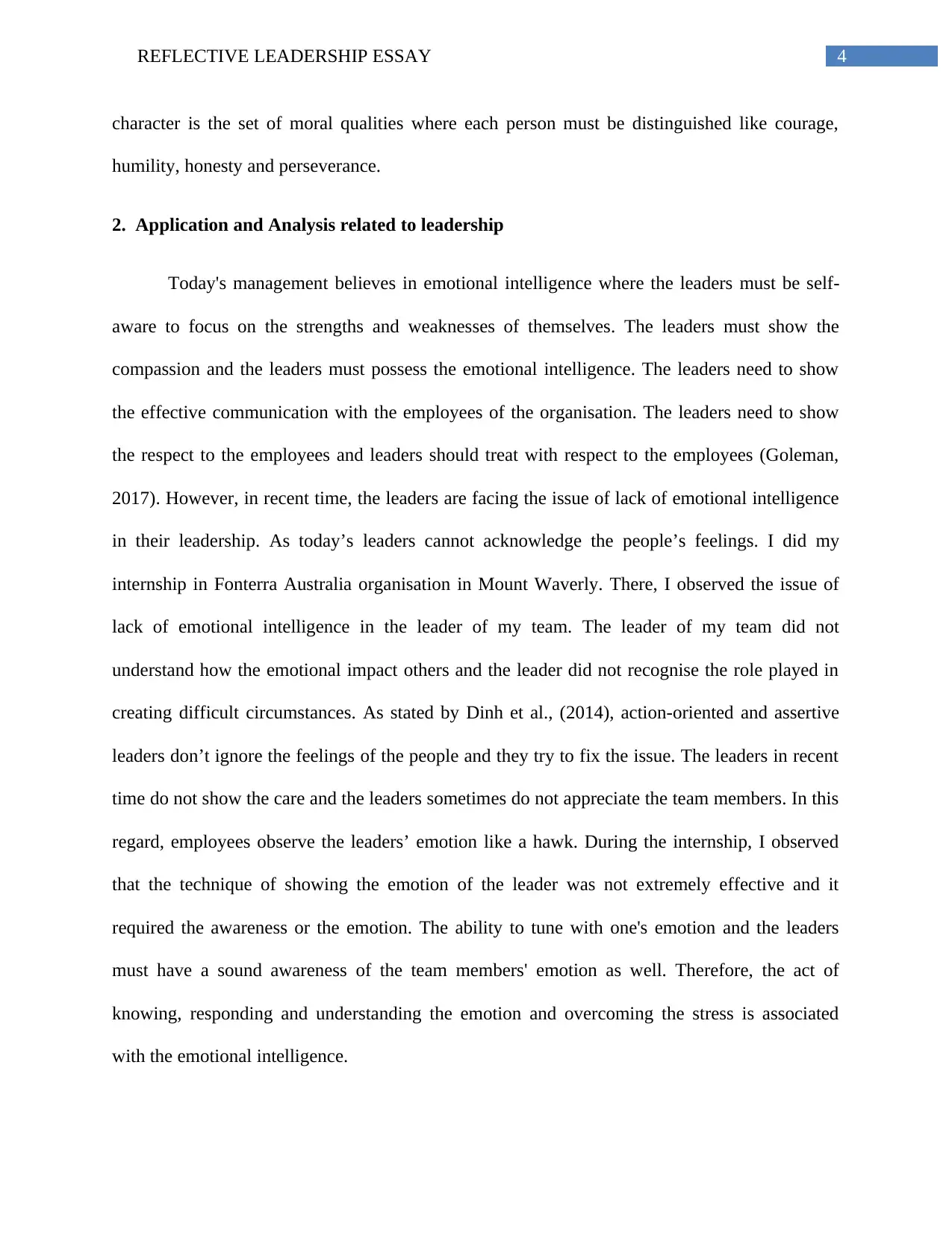
4REFLECTIVE LEADERSHIP ESSAY
character is the set of moral qualities where each person must be distinguished like courage,
humility, honesty and perseverance.
2. Application and Analysis related to leadership
Today's management believes in emotional intelligence where the leaders must be self-
aware to focus on the strengths and weaknesses of themselves. The leaders must show the
compassion and the leaders must possess the emotional intelligence. The leaders need to show
the effective communication with the employees of the organisation. The leaders need to show
the respect to the employees and leaders should treat with respect to the employees (Goleman,
2017). However, in recent time, the leaders are facing the issue of lack of emotional intelligence
in their leadership. As today’s leaders cannot acknowledge the people’s feelings. I did my
internship in Fonterra Australia organisation in Mount Waverly. There, I observed the issue of
lack of emotional intelligence in the leader of my team. The leader of my team did not
understand how the emotional impact others and the leader did not recognise the role played in
creating difficult circumstances. As stated by Dinh et al., (2014), action-oriented and assertive
leaders don’t ignore the feelings of the people and they try to fix the issue. The leaders in recent
time do not show the care and the leaders sometimes do not appreciate the team members. In this
regard, employees observe the leaders’ emotion like a hawk. During the internship, I observed
that the technique of showing the emotion of the leader was not extremely effective and it
required the awareness or the emotion. The ability to tune with one's emotion and the leaders
must have a sound awareness of the team members' emotion as well. Therefore, the act of
knowing, responding and understanding the emotion and overcoming the stress is associated
with the emotional intelligence.
character is the set of moral qualities where each person must be distinguished like courage,
humility, honesty and perseverance.
2. Application and Analysis related to leadership
Today's management believes in emotional intelligence where the leaders must be self-
aware to focus on the strengths and weaknesses of themselves. The leaders must show the
compassion and the leaders must possess the emotional intelligence. The leaders need to show
the effective communication with the employees of the organisation. The leaders need to show
the respect to the employees and leaders should treat with respect to the employees (Goleman,
2017). However, in recent time, the leaders are facing the issue of lack of emotional intelligence
in their leadership. As today’s leaders cannot acknowledge the people’s feelings. I did my
internship in Fonterra Australia organisation in Mount Waverly. There, I observed the issue of
lack of emotional intelligence in the leader of my team. The leader of my team did not
understand how the emotional impact others and the leader did not recognise the role played in
creating difficult circumstances. As stated by Dinh et al., (2014), action-oriented and assertive
leaders don’t ignore the feelings of the people and they try to fix the issue. The leaders in recent
time do not show the care and the leaders sometimes do not appreciate the team members. In this
regard, employees observe the leaders’ emotion like a hawk. During the internship, I observed
that the technique of showing the emotion of the leader was not extremely effective and it
required the awareness or the emotion. The ability to tune with one's emotion and the leaders
must have a sound awareness of the team members' emotion as well. Therefore, the act of
knowing, responding and understanding the emotion and overcoming the stress is associated
with the emotional intelligence.
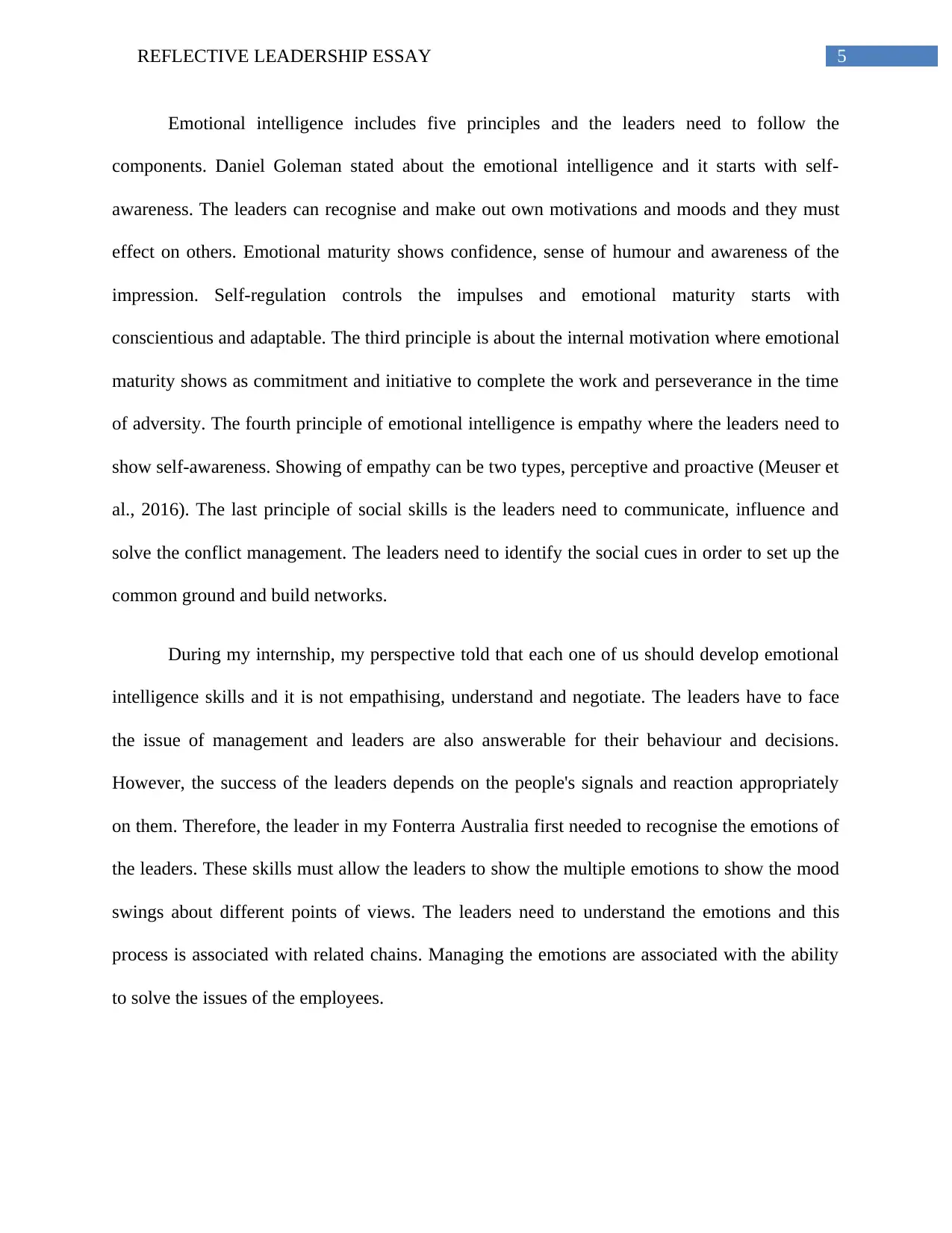
5REFLECTIVE LEADERSHIP ESSAY
Emotional intelligence includes five principles and the leaders need to follow the
components. Daniel Goleman stated about the emotional intelligence and it starts with self-
awareness. The leaders can recognise and make out own motivations and moods and they must
effect on others. Emotional maturity shows confidence, sense of humour and awareness of the
impression. Self-regulation controls the impulses and emotional maturity starts with
conscientious and adaptable. The third principle is about the internal motivation where emotional
maturity shows as commitment and initiative to complete the work and perseverance in the time
of adversity. The fourth principle of emotional intelligence is empathy where the leaders need to
show self-awareness. Showing of empathy can be two types, perceptive and proactive (Meuser et
al., 2016). The last principle of social skills is the leaders need to communicate, influence and
solve the conflict management. The leaders need to identify the social cues in order to set up the
common ground and build networks.
During my internship, my perspective told that each one of us should develop emotional
intelligence skills and it is not empathising, understand and negotiate. The leaders have to face
the issue of management and leaders are also answerable for their behaviour and decisions.
However, the success of the leaders depends on the people's signals and reaction appropriately
on them. Therefore, the leader in my Fonterra Australia first needed to recognise the emotions of
the leaders. These skills must allow the leaders to show the multiple emotions to show the mood
swings about different points of views. The leaders need to understand the emotions and this
process is associated with related chains. Managing the emotions are associated with the ability
to solve the issues of the employees.
Emotional intelligence includes five principles and the leaders need to follow the
components. Daniel Goleman stated about the emotional intelligence and it starts with self-
awareness. The leaders can recognise and make out own motivations and moods and they must
effect on others. Emotional maturity shows confidence, sense of humour and awareness of the
impression. Self-regulation controls the impulses and emotional maturity starts with
conscientious and adaptable. The third principle is about the internal motivation where emotional
maturity shows as commitment and initiative to complete the work and perseverance in the time
of adversity. The fourth principle of emotional intelligence is empathy where the leaders need to
show self-awareness. Showing of empathy can be two types, perceptive and proactive (Meuser et
al., 2016). The last principle of social skills is the leaders need to communicate, influence and
solve the conflict management. The leaders need to identify the social cues in order to set up the
common ground and build networks.
During my internship, my perspective told that each one of us should develop emotional
intelligence skills and it is not empathising, understand and negotiate. The leaders have to face
the issue of management and leaders are also answerable for their behaviour and decisions.
However, the success of the leaders depends on the people's signals and reaction appropriately
on them. Therefore, the leader in my Fonterra Australia first needed to recognise the emotions of
the leaders. These skills must allow the leaders to show the multiple emotions to show the mood
swings about different points of views. The leaders need to understand the emotions and this
process is associated with related chains. Managing the emotions are associated with the ability
to solve the issues of the employees.
⊘ This is a preview!⊘
Do you want full access?
Subscribe today to unlock all pages.

Trusted by 1+ million students worldwide
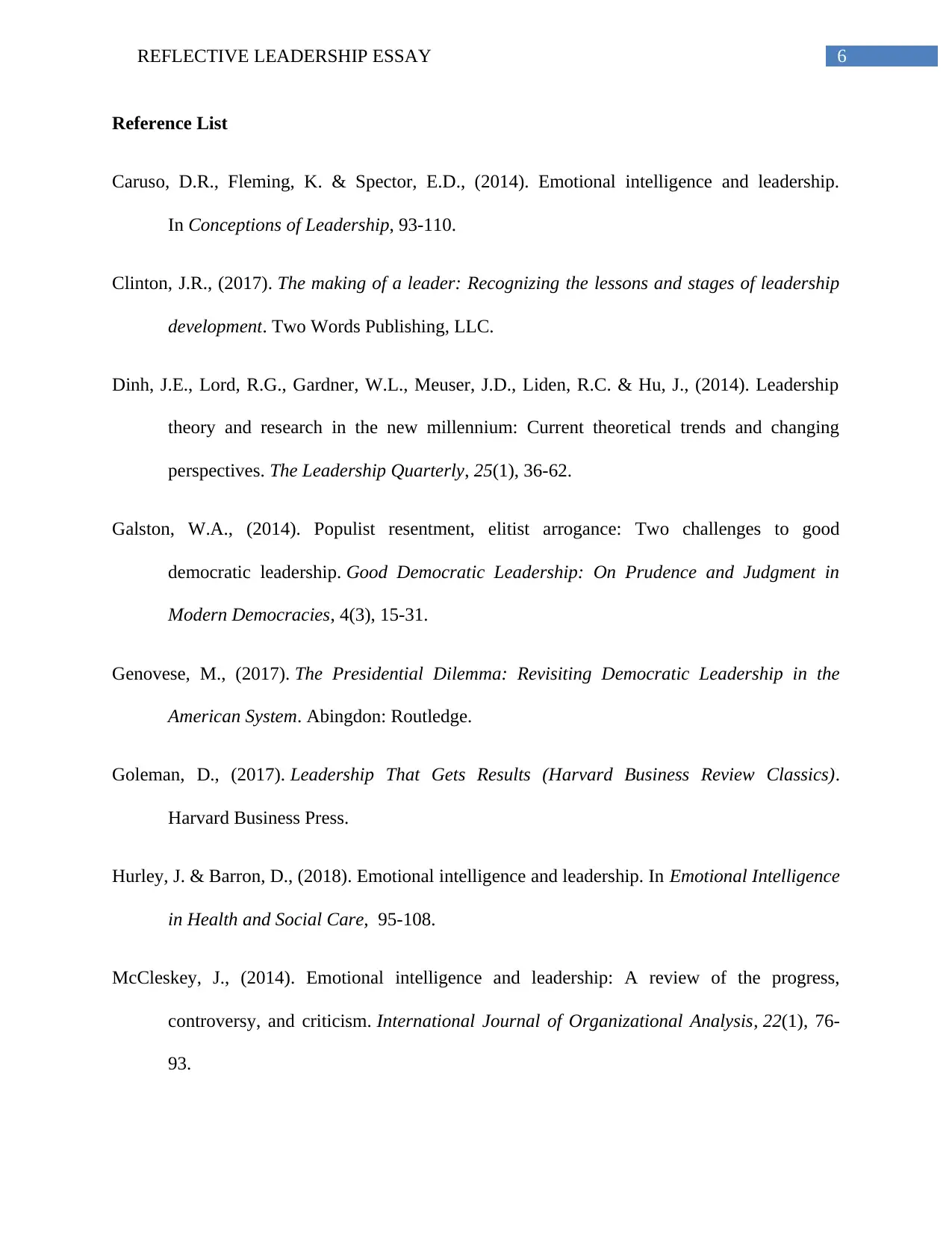
6REFLECTIVE LEADERSHIP ESSAY
Reference List
Caruso, D.R., Fleming, K. & Spector, E.D., (2014). Emotional intelligence and leadership.
In Conceptions of Leadership, 93-110.
Clinton, J.R., (2017). The making of a leader: Recognizing the lessons and stages of leadership
development. Two Words Publishing, LLC.
Dinh, J.E., Lord, R.G., Gardner, W.L., Meuser, J.D., Liden, R.C. & Hu, J., (2014). Leadership
theory and research in the new millennium: Current theoretical trends and changing
perspectives. The Leadership Quarterly, 25(1), 36-62.
Galston, W.A., (2014). Populist resentment, elitist arrogance: Two challenges to good
democratic leadership. Good Democratic Leadership: On Prudence and Judgment in
Modern Democracies, 4(3), 15-31.
Genovese, M., (2017). The Presidential Dilemma: Revisiting Democratic Leadership in the
American System. Abingdon: Routledge.
Goleman, D., (2017). Leadership That Gets Results (Harvard Business Review Classics).
Harvard Business Press.
Hurley, J. & Barron, D., (2018). Emotional intelligence and leadership. In Emotional Intelligence
in Health and Social Care, 95-108.
McCleskey, J., (2014). Emotional intelligence and leadership: A review of the progress,
controversy, and criticism. International Journal of Organizational Analysis, 22(1), 76-
93.
Reference List
Caruso, D.R., Fleming, K. & Spector, E.D., (2014). Emotional intelligence and leadership.
In Conceptions of Leadership, 93-110.
Clinton, J.R., (2017). The making of a leader: Recognizing the lessons and stages of leadership
development. Two Words Publishing, LLC.
Dinh, J.E., Lord, R.G., Gardner, W.L., Meuser, J.D., Liden, R.C. & Hu, J., (2014). Leadership
theory and research in the new millennium: Current theoretical trends and changing
perspectives. The Leadership Quarterly, 25(1), 36-62.
Galston, W.A., (2014). Populist resentment, elitist arrogance: Two challenges to good
democratic leadership. Good Democratic Leadership: On Prudence and Judgment in
Modern Democracies, 4(3), 15-31.
Genovese, M., (2017). The Presidential Dilemma: Revisiting Democratic Leadership in the
American System. Abingdon: Routledge.
Goleman, D., (2017). Leadership That Gets Results (Harvard Business Review Classics).
Harvard Business Press.
Hurley, J. & Barron, D., (2018). Emotional intelligence and leadership. In Emotional Intelligence
in Health and Social Care, 95-108.
McCleskey, J., (2014). Emotional intelligence and leadership: A review of the progress,
controversy, and criticism. International Journal of Organizational Analysis, 22(1), 76-
93.
Paraphrase This Document
Need a fresh take? Get an instant paraphrase of this document with our AI Paraphraser
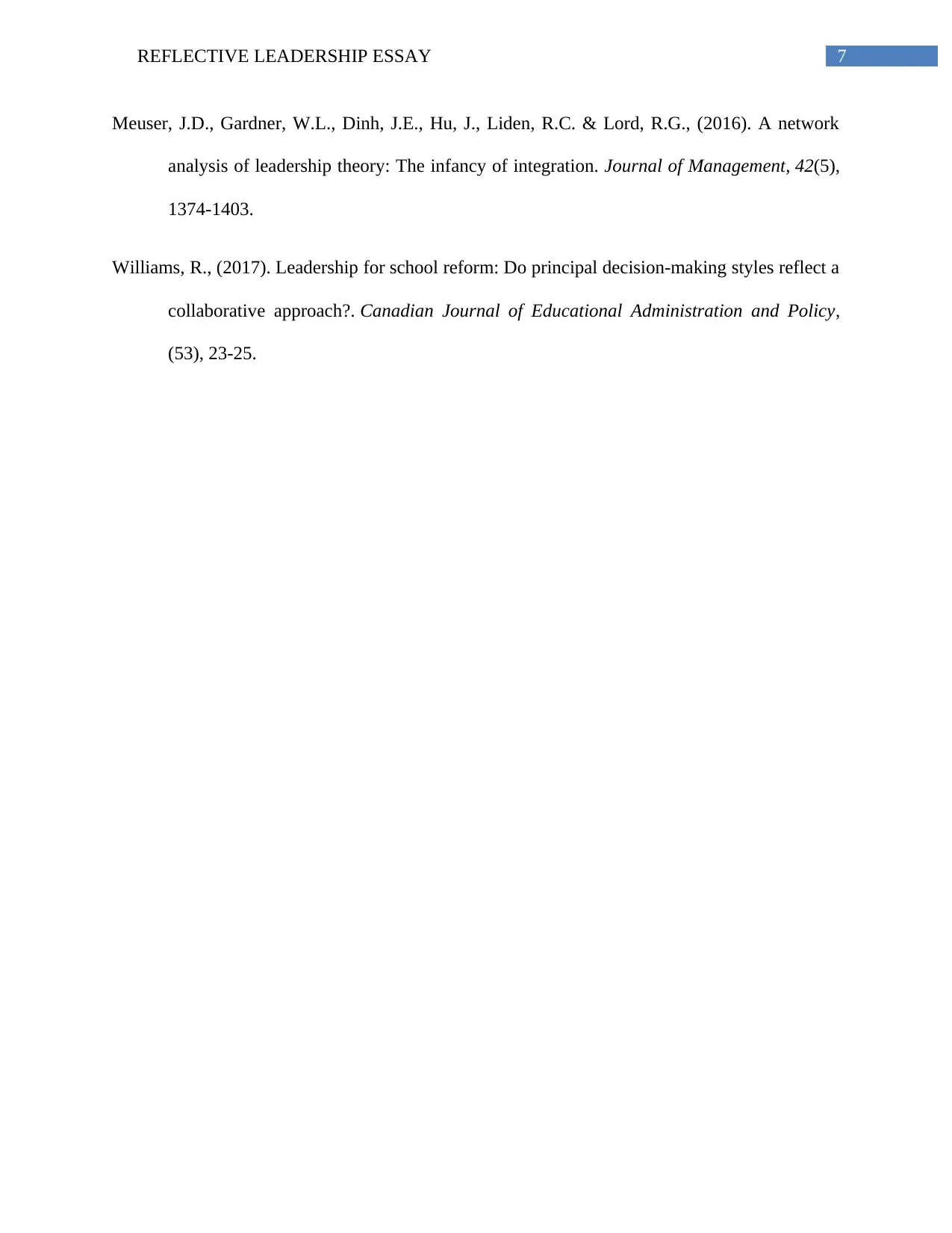
7REFLECTIVE LEADERSHIP ESSAY
Meuser, J.D., Gardner, W.L., Dinh, J.E., Hu, J., Liden, R.C. & Lord, R.G., (2016). A network
analysis of leadership theory: The infancy of integration. Journal of Management, 42(5),
1374-1403.
Williams, R., (2017). Leadership for school reform: Do principal decision-making styles reflect a
collaborative approach?. Canadian Journal of Educational Administration and Policy,
(53), 23-25.
Meuser, J.D., Gardner, W.L., Dinh, J.E., Hu, J., Liden, R.C. & Lord, R.G., (2016). A network
analysis of leadership theory: The infancy of integration. Journal of Management, 42(5),
1374-1403.
Williams, R., (2017). Leadership for school reform: Do principal decision-making styles reflect a
collaborative approach?. Canadian Journal of Educational Administration and Policy,
(53), 23-25.
1 out of 8
Related Documents
Your All-in-One AI-Powered Toolkit for Academic Success.
+13062052269
info@desklib.com
Available 24*7 on WhatsApp / Email
![[object Object]](/_next/static/media/star-bottom.7253800d.svg)
Unlock your academic potential
Copyright © 2020–2026 A2Z Services. All Rights Reserved. Developed and managed by ZUCOL.




![Leadership and Management Reflection Report - [Course Name]](/_next/image/?url=https%3A%2F%2Fdesklib.com%2Fmedia%2Fimages%2Ftd%2F609a50cd4c7044d196b9d89d4e436278.jpg&w=256&q=75)
